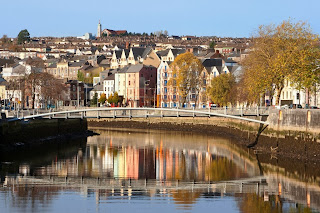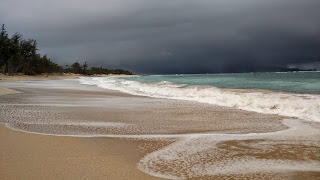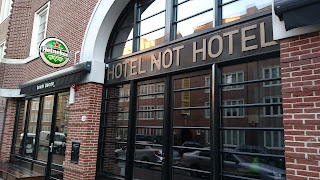Same Latitude, Different Poles (D.C. vs. SF)
Even though I'm a nature boy, I love the idea of cities as being these stews of tradition, innovation, ethnic heritage/composition, geography and industry. Mix it all up and you get something unique each time. There are however sister cities or metros that seek to learn from one another. Sister cities are more than just cutesy titles. San Francisco, California and Cork, Ireland, for instance, employ a real practice of exchanging business, cultural, technical and educational knowledge over the long-term. The Rebel Cork Benevolent Association, a group of native Corkers laid the groundwork for a sister city partnership when they started meeting in 1883 to exchange ideas among themselves in this strange city on the western edge of the U.S. The RCBA was also a vehicle of families helping each other in times of need. More and more Corker pilgrims made the westward journey and soon enough an official relationship seemed a foregone conclusion. The sisterhood was officially formed just over 100 years later under the leadership of then SF mayor Dianne Feinstein.
A relationship is formally created when the mayors or highest elected officials from two communities sign a memorandum of understanding establishing the sister city partnership. San Francisco's sister cities include the following (as listed by the Sister Cities International website):
But while some cities are close like sisters other metros coexist like rivals. I had always thought Boston to be San Francisco's moral/ethical/cultural opposite but now I believe that title has shifted south of the Mason-Dixon line, to the nation's capital, Washington, District of Columbia. Let's look at the personalities. One believes in a top-down approach while Baghdad-by-the-Bay bubbles up from the bottom with tech-hungry populace that believes anyone can be a taxi driver. D.C., however, does have some superb civic institutions (the Smithsonian and National Air and Space Museum among dozens of others) that are free to the public. SF, admittedly, falls short in this department, reveling instead in the great outdoors. So the cliche is true: the East Coast is the capital of formal culture and the West Coast capital of informal one.
The two have some other personality traits at endless odds with one another. SF is a happy and earnest place without much complexity. Sadly this is reflected in popular culture. D.C. has the addictive and formidable House of Cards while SF is stuck with Full House. At near identical latitude (DC at 38 degrees north to SF's 37), they look like the two poles that keep the continental U.S. from either smiling or frowning. Add to the mix the government shutdown in which we are now trudging through our 4th day. Even though conservatives deride California as being business-antagonist, I feel that San Francisco is all too ready to work and deliver. In fact, it's probably the most capitalist place I've ever lived. So while D.C. may be okay with paralysis, SF wants to move our country forward and has been finding considerable success in a philosophy of solutionism, a thriving tech-architecture that ignores the political morass of yesteryears and the inefficiency of towns stuck in the past.
While solutionism has its detractors, at least these gen-y kids are actually doing something to make life a little easier. You'd be hard pressed to say the same thing about clunky D.C. this week.
- Abidjan, Ivory Coast
- Assisi, Italy
- Cork, Ireland
- Haifa, Israel
- Ho Chi Minh City, Vietnam
- Manila, Philippines
- Osaka, Japan
- Seoul, South Korea
- Shanghai, China
- Sydney, Australia
- Taipei Municipality
- Thessaloniki, Greece
- Zurich, Switzerland
But while some cities are close like sisters other metros coexist like rivals. I had always thought Boston to be San Francisco's moral/ethical/cultural opposite but now I believe that title has shifted south of the Mason-Dixon line, to the nation's capital, Washington, District of Columbia. Let's look at the personalities. One believes in a top-down approach while Baghdad-by-the-Bay bubbles up from the bottom with tech-hungry populace that believes anyone can be a taxi driver. D.C., however, does have some superb civic institutions (the Smithsonian and National Air and Space Museum among dozens of others) that are free to the public. SF, admittedly, falls short in this department, reveling instead in the great outdoors. So the cliche is true: the East Coast is the capital of formal culture and the West Coast capital of informal one.
The two have some other personality traits at endless odds with one another. SF is a happy and earnest place without much complexity. Sadly this is reflected in popular culture. D.C. has the addictive and formidable House of Cards while SF is stuck with Full House. At near identical latitude (DC at 38 degrees north to SF's 37), they look like the two poles that keep the continental U.S. from either smiling or frowning. Add to the mix the government shutdown in which we are now trudging through our 4th day. Even though conservatives deride California as being business-antagonist, I feel that San Francisco is all too ready to work and deliver. In fact, it's probably the most capitalist place I've ever lived. So while D.C. may be okay with paralysis, SF wants to move our country forward and has been finding considerable success in a philosophy of solutionism, a thriving tech-architecture that ignores the political morass of yesteryears and the inefficiency of towns stuck in the past.
While solutionism has its detractors, at least these gen-y kids are actually doing something to make life a little easier. You'd be hard pressed to say the same thing about clunky D.C. this week.






Comments
Post a Comment